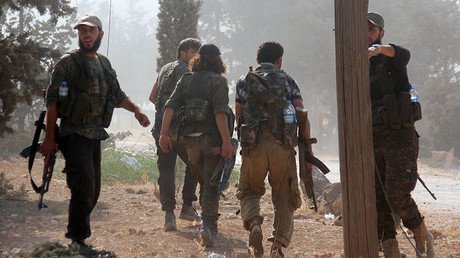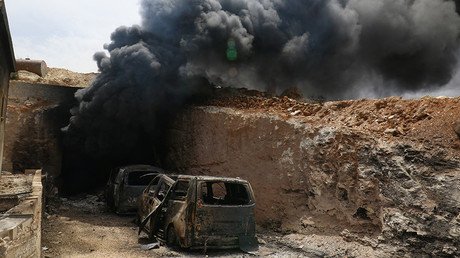Russia, Iran, Turkey sign agreement on creation of Syria safe zones
Ceasefire guarantor states Russia, Iran and Turkey have adopted a memorandum on the creation of four security zones in Syria, during peace talks in the Kazakh capital of Astana.
The de-escalation zones were earlier proposed by Russia. They are aimed at separating extremist groups, including Islamic State terrorists (IS, formerly ISIS/ISIL) and Jabhat al-Nusra (Al-Nusra Front), from the moderate opposition.
Idlib, Latakia and Homs are included in the safe zones, as well as parts of Aleppo, according to the Turkish Foreign Ministry. Under the memorandum, any fighting between government forces and armed opposition will cease within the safe zones.
Checkpoints and observation posts are to be positioned along the de-escalation lines within the safe zones, according to the document. They will provide free movement of unarmed civilians and humanitarian access to the areas, under guarantor states’ control.
Russian chief negotiator Aleksandr Lavrentyev stated that Russia is ready to send its observers to the established zones and work more closely with the US and Saudi Arabia on Syria. He also said that a working group on an exchange of captives could be settled by the evening.
However, he lamented the US poor participation in establishing better cooperation.
"Unfortunately, the Americans are still ignoring our attempts to establish closer military cooperation, but we will keep trying," the Russian chief negotiator said.
The Syrian armed opposition delegation stated it could not accept the memorandum, saying the creation of de-escalation zones would threaten Syria’s territorial integrity. It also stated it will not sign anything while Iran remains among the guarantor states.
"We are against the division of Syria. As for the agreements, we are not a party to that agreement and of course we will never be in favor [of it] as long as Iran is called a guarantor state," opposition delegate Osama Abu Zaid said.
Some representatives of the Syrian armed opposition walked out of the meeting, according to media reports.
“We don’t accept Iran’s participation as a guarantor state,” one opposition delegation member reportedly shouted during a speech by Kazakhstan’s foreign minister at the signing ceremony.
Most members of the delegation reportedly remained in the room, however.
Iran says it is a massive step toward the de-escalation of the long-standing conflict and bloodshed in Syria.
"We support any initiative aimed at de-escalation of the conflict in Syria, prevention of bloodshed, destruction, leading to the fleeing of the Syrian people from their native territory. We support any step aimed at a ceasefire," an Iranian Foreign Ministry official told RIA Novosti.
The UN special envoy on Syria, Staffan de Mistura, welcomed the deal, calling it “an important, promising, positive step in the right direction in the process of de-escalation of the conflict.”
The next round of Syrian peace talks will be hosted by Astana in mid-July, with expert meetings scheduled to be held two weeks beforehand, according to Kazakh Foreign Minister Kairat Abdrakhmanov.
READ MORE: ‘Russia, Iran & Turkey move center of gravity over Syria from Geneva to Astana’
“Given the new round of Geneva talks, which is to be held in late May and emphasizing the essential role of the Astana meetings in supplementing and assisting the Geneva process, we call on all members of the international community to contribute to this process and to find a lasting solution to the Syrian conflict,” the minister stated.














